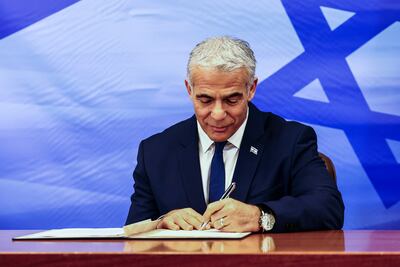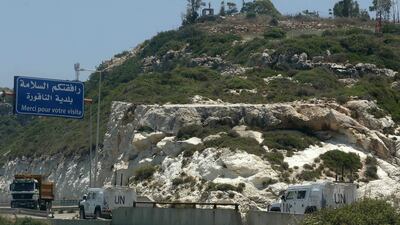Lebanon and Israel officially signed off on a maritime deal with each other, a milestone for two countries that technically remain at war.
Lebanese President Michel Aoun and Israeli Prime Minister Yair Lapid separately signed their respective versions, which finally demarcate their borders within the Mediterranean.
“This agreement was written with the idea in mind that it was between two countries that don’t have diplomatic relations,” said Amos Hochstein, the US energy envoy who mediated the indirect negotiations, after meeting Mr Aoun and other senior Lebanese officials at the presidential palace in Baabda.
The deal could in theory reduce the chances of conflict between Israel and Iran-backed Hezbollah, the influential Lebanese armed group and political party that had threatened Israel over any planned exploration of disputed areas before an agreement was reached.
Hezbollah chief Hassan Nasrallah said on Thursday that the signing of the deal is a “very big victory for Lebanon”. The Lebanese government had been careful not to take any steps “that even smelt of normalisation,” he said.
Mr Nasrallah said the “exceptional” military measures his group had taken in recent months against Israel had now ended with the conclusion of the deal. In July, Israel shot down three surveillance drones that Hezbollah had sent to a gasfield that was part of the dispute.
“All the exceptional and special measures and mobilisation carried out by the resistance for several months are now declared over,” Mr Nasrallah said.
Elias Bou Saab, Lebanon's Deputy Parliament Speaker and lead negotiator, said the demarcation agreement signalled the start of “a new era”.
The letter signed by Mr Aoun, which signalled Beirut's acceptance of the deal, was given to the UN in the presence of US officials at Lebanon's southernmost border point of Naqoura later on Thursday, he said.
Mr Aoun signed the deal in Baabda while Mr Lapid did so in Jerusalem.
The Lebanese president later insisted the deal did not represent a change in Lebanon's foreign policy.
The countries have never had diplomatic relations since Israel was created in 1948, with their border patrolled by a UN peacekeeping mission.
Mr Lapid had earlier on Thursday claimed that “it is not every day that an enemy country recognises the state of Israel, in a written agreement, in view of the international community”.

Lebanese officials have repeatedly insisted that the deal does not represent a working relationship, let alone a step towards normalisation between the countries.
US President Joe Biden offered his congratulations as the parties “took the final steps to bring the agreement into force and submitted the final paperwork” at Naqoura.
“As I said when this historic agreement was announced, it will secure the interests of both Israel and Lebanon, and it sets the stage for a more stable and prosperous region.
“The United States will continue to serve as a facilitator as the parties work to uphold their commitments and implement this agreement. Energy — particularly in the Eastern Mediterranean — should not be a cause for conflict, but a tool for cooperation, stability, security, and prosperity,” he said.
Both countries announced their verbal approval of the deal two weeks ago after months of negotiations mediated by Mr Hochstein.
Under the agreement, the disputed waters will be divided along a line that straddles the Qana prospect gasfield. Production and exploration will be based on the Lebanese side but Israel will be compensated for any gas extracted from its side of the line.
After meeting Mr Hochstein on Thursday morning, the office of Lebanon's caretaker prime minister Najib Mikati expressed hope that “what we have achieved will be an essential step on the path to benefiting from Lebanon's wealth of gas and oil, which will contribute to solving the financial and economic crises that Lebanon is going through, and help the Lebanese state to rise again”.
However, it will be years before Lebanon reaps any potential benefit from the Qana prospect. It remains unclear how viable Qana is for hydrocarbon exploration.
Lebanon is in dire need of any economic impetus that it can get amid a financial crisis described by the World Bank as one of the worst in modern history.
Much of the population has now been plunged into poverty, with widespread shortages of clean water, bread, medicines, electricity and other basic essentials.












